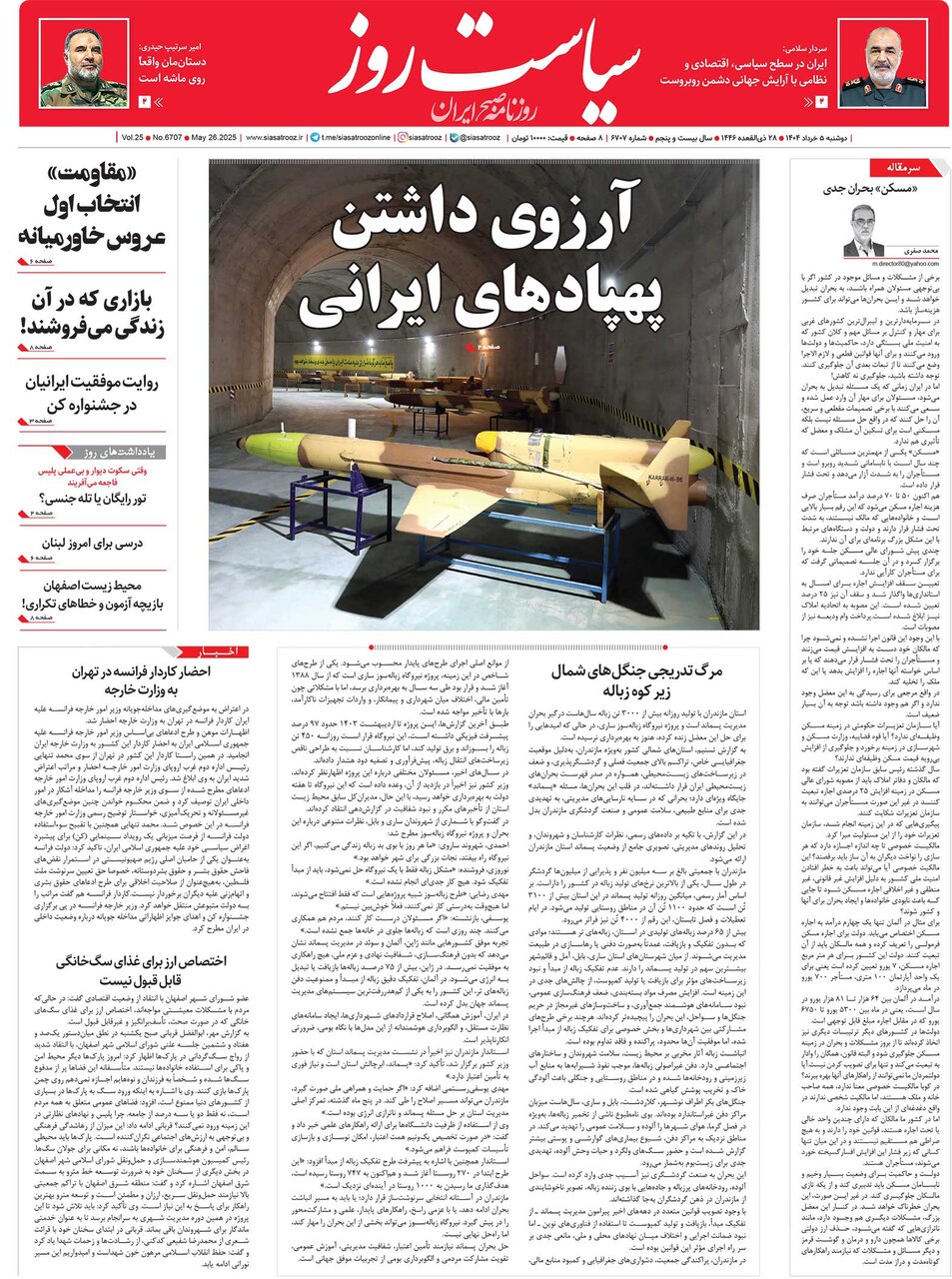The desire to have Iranian drones

TEHRAN - In a note, Siasat-e-Rooz discussed the power and value of Iranian drones.
It wrote: The manufacturing of drones in Iran dates back to the early years of the Islamic Revolution, when Iranian youth entered the battlefield without any knowledge, during the Sacred Defense years. Thanks to indigenous knowledge and reverse engineering of equipment, Iran benefits from a large and diverse fleet of drones. These drones don’t cost a few million dollars. They are only a few thousand dollars. They are so efficient that even major countries dream of having them. Iranian drones have been talked about for years, and many armed forces around the world have seen their efficiency. Some countries have also bought them. President Donald Trump, who had recently traveled to certain Persian Gulf Arab countries, pointed to the Iranian drones in Qatar in the presence of the heads of the largest American companies, describing them as: "Very good, fast and deadly."
Donya-e-Eqtesad: Government must restore the market's trust
In an analysis, Donya-e-Eqtesad addressed the market's reaction and political developments, especially the nuclear negotiations. It wrote: The market's behavior showed for the umpteenth time this year that the domestic market is optimistic about the political negotiations between Iran and the United States, and this is the most important and reliable indicator for strengthening the possible success of the negotiations. This behavior is natural in the Iranian economy. In other words, it is understandable and acceptable. It seems that policymakers are not happy with this market behavior and view it as a negative signal in the negotiations, as well as a weakening of the Iranian side's bargaining power and as an abuse by the other side to impose its will on Iran. However, the reality is that the government should see this role of the market not as a threat and a factor of weakness, but as a great and unique opportunity for internal consensus and national unity, as well as mobilizing the country's capacities in the field of diplomatic warfare, and make the necessary use of it during the negotiations and advancing political and economic goals. The government should use the return of market confidence in itself and its domestic policies and movements as an opportunity.
Iran: Redefining neighborhood in new equations
In a commentary, the Iran newspaper discussed the visit of Pakistani Prime Minister Shahbaz Sharif to Tehran and said: Shahbaz Sharif has started a whirlwind diplomatic tour that began in Ankara, visited Tehran (on Monday), and then makes stops in Baku and Dushanbe. This trip, which is a sign of Islamabad's special approach to strengthening bilateral relations with key neighbors and allies, is taking place at a sensitive time given regional tensions. The presence of the Pakistani Prime Minister in Tehran is not just a stop on his regional tour; it is also a sign of the intersection of interests between the two countries in the security and economic fields, especially since the Pezeshkian government has tried to design a new model of bilateral relations and effectively counter efforts intended to harm Tehran-Islamabad relations. According to Mashallah Shakeri, the former Iranian ambassador to Pakistan, this visit is an important step in reviving ties between Tehran and Islamabad; ties that have sometimes been troubled by misunderstandings and geopolitical developments, but have always provided the opportunity to rebuild trust and strengthen ties.
Ettelaat: Why did Witkoff leave negotiating table with Iran?
In an article, Ettelaat analyzed Steve Witkoff’s unconventional departure from the negotiations table in Rome by seeking the views of Mehdi Motaharnia, an analyst on international and political issues. He says: Witkoff’s departure from the negotiations was unexpected and naturally a bad excuse to express a behavior that will send the message associated with his departure. This departure and its consequences indicate an issue that Witkoff had previously acknowledged that if Iran does not accept the United States’ red lines, he will leave the negotiations. Based on what we are now observing, the negotiations have reached a very sensitive stage. These negotiations, which were held with the mediation of Oman, have reached a deadlock. If we want to focus on the main points of the negotiations, we can say that there is a difference over nuclear enrichment. Iran emphasizes its sovereign right to enrich uranium inside the country and believes that the Iranian government should be free to exercise this sovereign right, while the United States demands a complete halt to these activities.
Leave a Comment